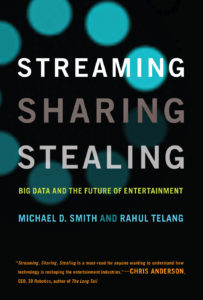Connections

Q&A With HITS Keynote, Professor Michael Smith
Story Highlights
When Michael Smith, professor of information technology and marketing at Carnegie Mellon University’s H. John Heinz III College, takes the stage Oct. 18 for the HITS Fall: Digipalooza Conference, his keynote presentation will have a message for major studios and other legacy entertainment players: adapt or die.
The sheer amount of changes underway in the media and entertainment sector has many traditional players on their heels, with disruptors like Netflix and Amazon taking better advantage of things like big data and analytics and online distribution.
Co-author of the “Streaming, Sharing, Stealing: Big Data and the Future of Entertainment” (with Rahul Telang, assistant professor of information systems at the college, who is moderating a panel at HITS), Smith gave the Media & Entertainment Services Alliance (MESA) a preview of his presentation.
MESA: Not to give too much away, but what can attendees at the HITS conference expect from your presentation?
 Smith: In our book, we argue that technological change poses two important questions for Hollywood: The first question is how is technology impacting the entertainment business and what today’s leaders do to respond?
Smith: In our book, we argue that technological change poses two important questions for Hollywood: The first question is how is technology impacting the entertainment business and what today’s leaders do to respond?
For most industries, just answering this would be enough, but for entertainment a second question is vitally important: Is technology likely to harm the creative process and quality of entertainment?
MESA: What are the most impactful ways big data is changing Hollywood and how the media and entertainment business operates?
Smith: In the book, Rahul and I identify five key trends, that we discuss in detail in chapters 5-9 of the book:
- Long tail markets
- Digital piracy
- User-generated content
- Powerful online distributors
- Big data and data analytics
At first glance, none of these shifts seems like a threat to the existing leaders in the industry. After all, long tail markets are dominated by old and failed products that don’t sell very well.
Digital piracy, although certainly harmful to sales, impacts all of the market leaders equally, so it shouldn’t change the competitive balance in the industry.
 User-generated content is generally amateur fare — cats riding Roombas and kids playing Minecraft. Online distributors like Amazon and Netflix, have power in their space, but rely on the major entertainment companies for their high value content. And big data and analytics can never replace the creative process.
User-generated content is generally amateur fare — cats riding Roombas and kids playing Minecraft. Online distributors like Amazon and Netflix, have power in their space, but rely on the major entertainment companies for their high value content. And big data and analytics can never replace the creative process.
In the book, however, we argue that the real risk to the business comes from the fact that these five shifts are all happening at the same time in a way that weakens the traditional sources of power and profit in the industry, and create new sources of market power and profit that will be difficult (but not impossible!) for today’s companies to harness.
MESA: What can the legacy Hollywood players be doing better to confront disruptors like Netflix and Amazon?
Smith: The last two chapters in the book answer this question by arguing that today’s entertainment leaders should use their existing strengths in content ownership and content creation to more aggressively invest in new shared online streaming platforms, such as Hulu.com, and should more aggressively invest in building an internal culture of data-driven management.
MESA: What do you hope attendees will take away from the presentation?
Smith: We hope attendees will take away a clear understanding of why the business is changing and how today’s business leaders can respond to these threats; and also a strong sense of optimism about the opportunities these changes hold for future of the business and the future of creativity.
Taking place at Loews Hollywood Hotel, the HITS Fall: Digipalooza Conference is produced by the Media & Entertainment Services Alliance (MESA) and the Hollywood IT Society (HITS) with sponsorship by Cast & Crew Entertainment Services, GrayMeta, Okta, Microsoft Azure, FilmTrack and Zaszou IT Consulting.
To register or for more information, click here.









